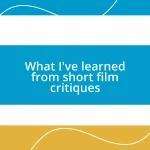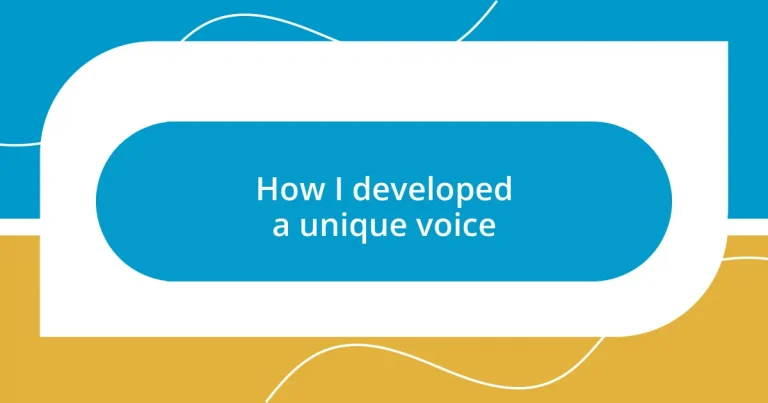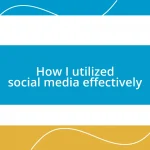Key takeaways:
- Development of a unique voice involves personal experiences and emotional vulnerability, enhancing authenticity in writing.
- Identifying and refining one’s personal writing style relies on experimentation, feedback, and reflection on past works.
- Embracing authenticity includes being vulnerable, trusting your instincts, and resisting trends to cultivate a genuine voice.
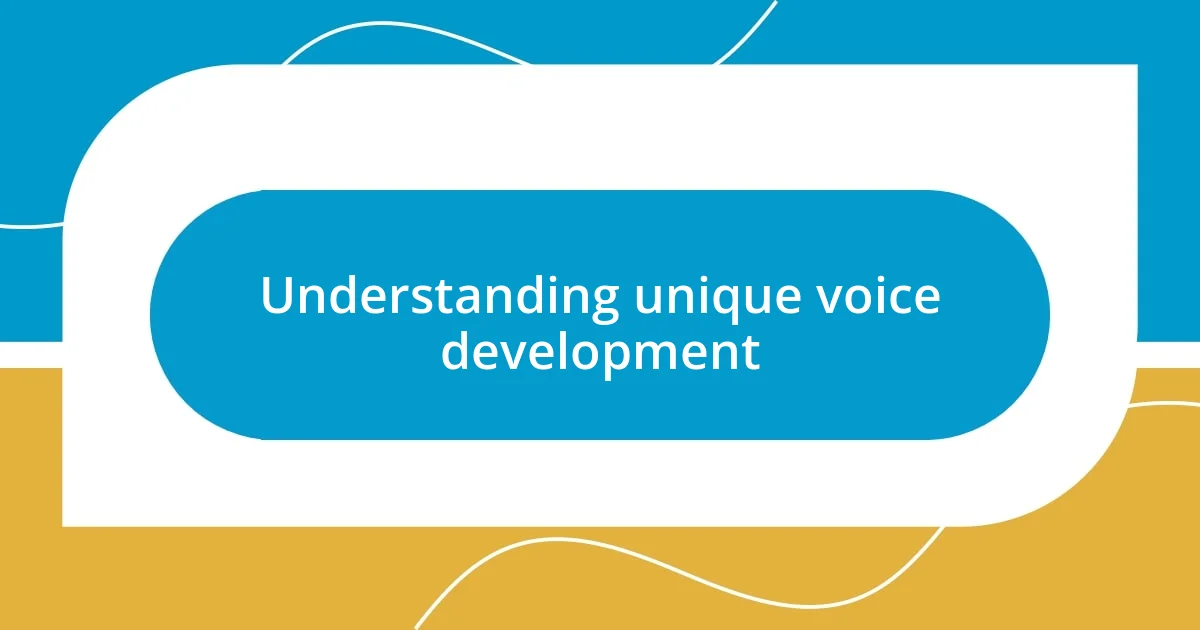
Understanding unique voice development
Understanding your unique voice development is a journey shaped by countless experiences and influences. I remember the first time I heard my own writing read aloud; it felt jarring yet exhilarating. Have you ever recognized your voice in someone else’s work? That moment of connection is crucial—it highlights our individuality amid shared experiences.
As I experimented with different styles, I discovered that my voice emerged not just from my written words, but also from my emotions. Each time I infused a piece with a personal story, I felt it resonate deeper with my audience. Isn’t it fascinating how vulnerability can enhance authenticity in our writing? Embracing our fears and joys allows us to craft a voice that is undeniably ours.
With every draft, I learned to trust my instincts and let my personality shine through. One particularly challenging piece forced me to confront my insecurities, but by the end, I felt a surge of pride. Can you think of a time when stepping outside your comfort zone revealed something powerful about your own voice? That moment of self-discovery is often the key to developing a unique and compelling voice.
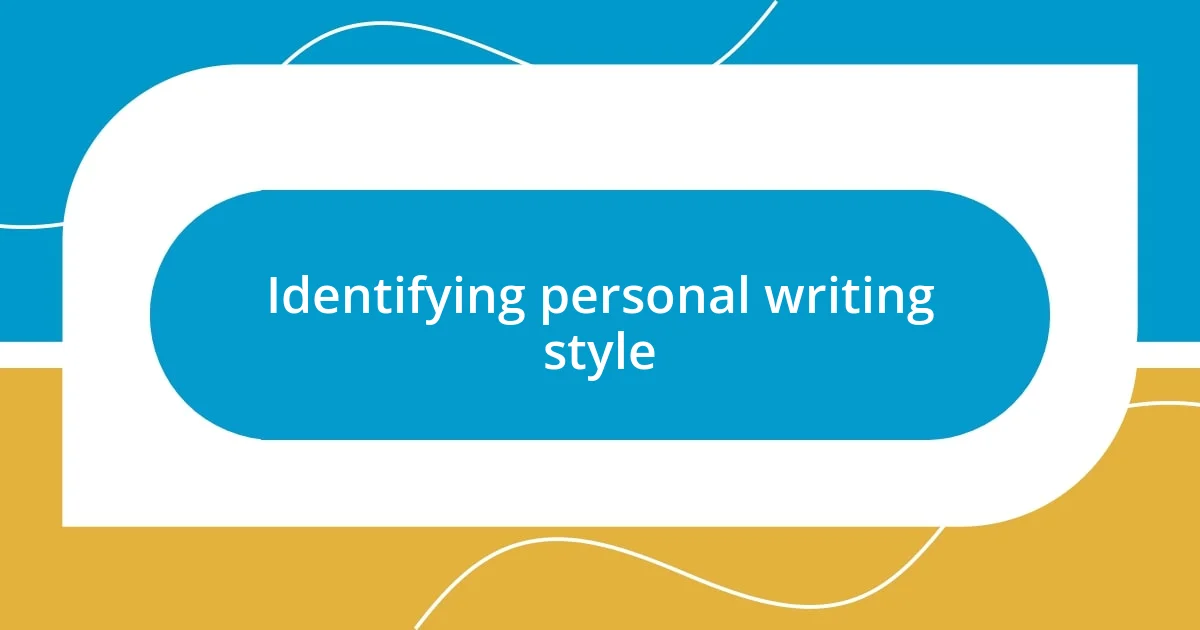
Identifying personal writing style
Identifying your personal writing style can feel like piecing together a puzzle. I remember sifting through my past pieces, realizing that certain phrases and rhythms consistently surfaced. Have you ever noticed a word or tone that just felt like you? That’s a clue! These aspects are essential in recognizing what resonates with you, illuminating the path toward your distinctive voice.
Reflecting on my journey, I found inspiration in various authors, yet I knew I had to differentiate myself. One poignant moment was when I deliberately chose to write about a personal loss. As the words flowed onto the page, I uncovered layers of resilience and raw emotion that had always been there, waiting to be expressed. That experience solidified my belief that authentic writing stems from deeply personal experiences. What stories do you hold that could define your voice?
To develop a true sense of style, I practiced regularly and sought feedback. I recall sharing early drafts with friends, and their responses often highlighted patterns I hadn’t consciously noticed. Through constructive criticism, I fine-tuned my tone and approach, which gradually sculpted my unique signature. Don’t underestimate the power of external perspectives—what they see might surprise you!
| Aspect | Example |
|---|---|
| Word Choice | Using vivid, evocative language to convey emotion |
| Sentence Structure | Mixing short, impactful sentences with longer, flowing descriptions |
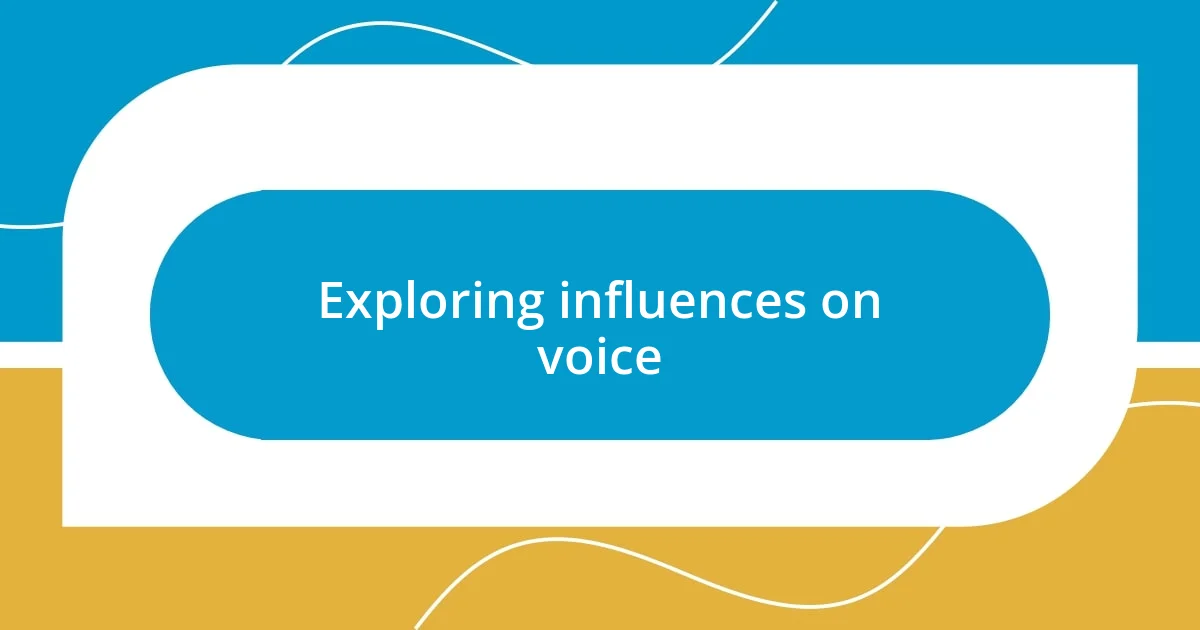
Exploring influences on voice
Exploring the influences on my voice involved a fascinating dance with various sources of inspiration. I often found myself drawn to the distinct styles of my favorite authors, but I also learned that my voice needed to diverge from those influences. There was a moment when I stumbled upon an old journal entry. As I reread it, I laughed at the awkward phrasing yet felt a sense of nostalgia. That youthful honesty sparked something within me; I realized the importance of blending influences with my narrative.
To really dig deeper, I reflected on the aspects that shaped my voice:
- Literary Influences: Reading diverse genres opened my mind to different styles, urging me to experiment.
- Personal Experiences: Moments of joy, heartbreak, and everything in between added layers to my writing, weaving authenticity into my words.
- Feedback from Others: Listening to constructive criticism helped me spot nuances that set my voice apart.
Through this exploration, I came to see my writing as a tapestry woven from various threads: inspiration here, emotion there, all culminating in a voice distinctly my own. The process is ongoing, and I find that each experience invites new dimensions to my voice.
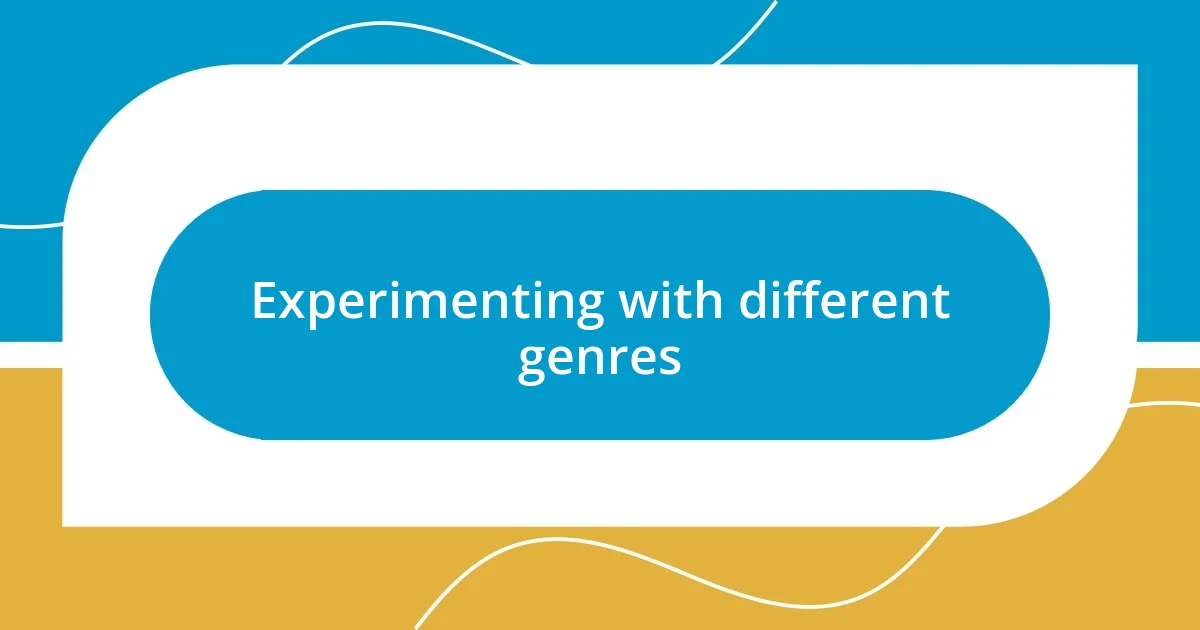
Experimenting with different genres
Experimenting with different genres was a turning point for me. I vividly recall the first time I dabbled in science fiction. The world-building pulled me in, allowing me to stretch my imagination in ways I hadn’t considered before. Have you ever stepped into a genre that completely altered your perspective? For me, it revealed how versatile my voice could be, opening doors to ideas and characters that felt foreign yet thrilling.
One remarkable experience was when I wrote a series of flash fiction pieces. Each story was just a few hundred words, yet they demanded precision and creativity. It was like trying to capture a vivid dream in a tiny jar. Through this concise form, I discovered a new rhythm to my writing, embracing brevity without sacrificing emotion. I began to wonder: what hidden gems of expression could I uncover in such a limited space?
As I explored poetry, I found an unexpected connection with my feelings. The lyrical nature of verse allowed me to play with sound and cadence, transforming simple observations into profound insights. I remember one late night, writing lines that poured from my soul like a release. That moment reaffirmed my understanding that genres aren’t just categories—they’re avenues for deeper self-expression. What genre might resonate with your unique voice?
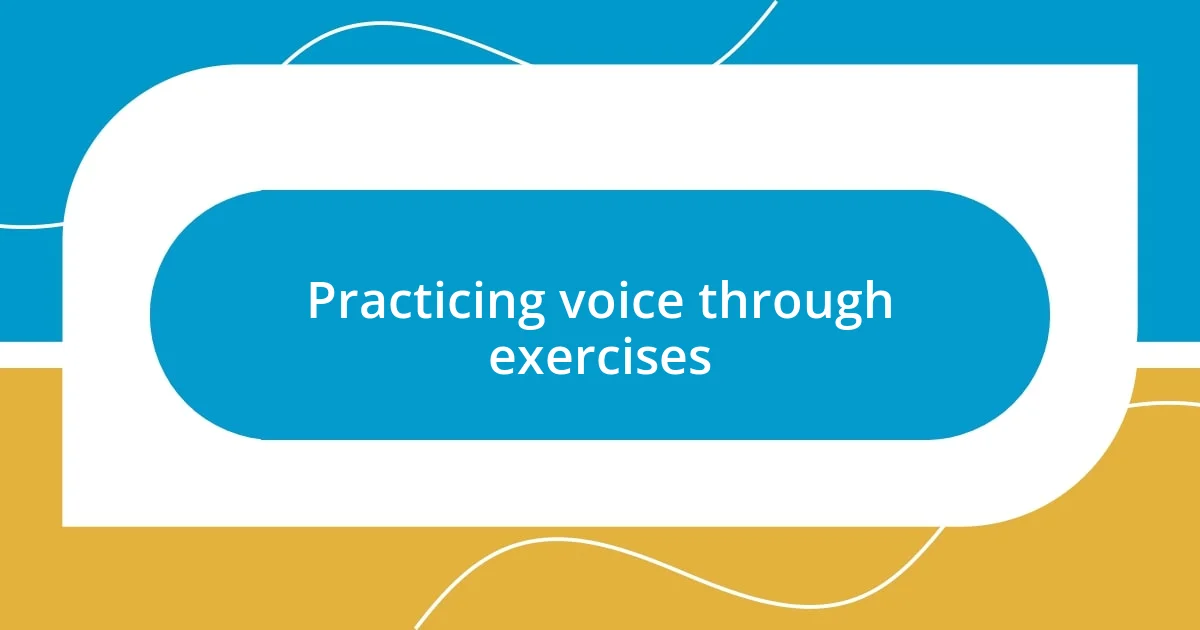
Practicing voice through exercises
Practicing voice through exercises has been crucial in my development as a writer. One technique I often return to is free writing, where I set a timer for ten minutes and write without stopping. The sheer act of letting thoughts flow unfiltered has led me to some surprising revelations about my style. Have you ever stumbled upon a hidden gem in your own writing while trying this? I certainly did when I found an unexpected line that felt distinctly “me,” igniting a spark of inspiration for future pieces.
Another exercise I find valuable is reading aloud. I remember one evening, sitting by my window, reading my work with a warm cup of tea in hand. The experience of hearing my words come to life added a rich texture I hadn’t realized was missing. It made me more aware of how sentence rhythm influences emotion, almost like music dancing through the air. I encourage you to try this; you might discover a newfound appreciation for the cadence of your voice, too.
Role-playing as different characters is another fun and impactful exercise I love engaging in. I once took a character I created and wrote a diary entry from their perspective. It allowed me to step outside my usual voice and explore the raw, unfiltered thoughts of someone else. By doing this, I not only honed my ability to switch tones but also discovered new facets of my own voice. How would your voice change if you adopted a completely different persona for a day? Exploring these exercises has not only enriched my writing but also connected me deeply with my own authentic expression.
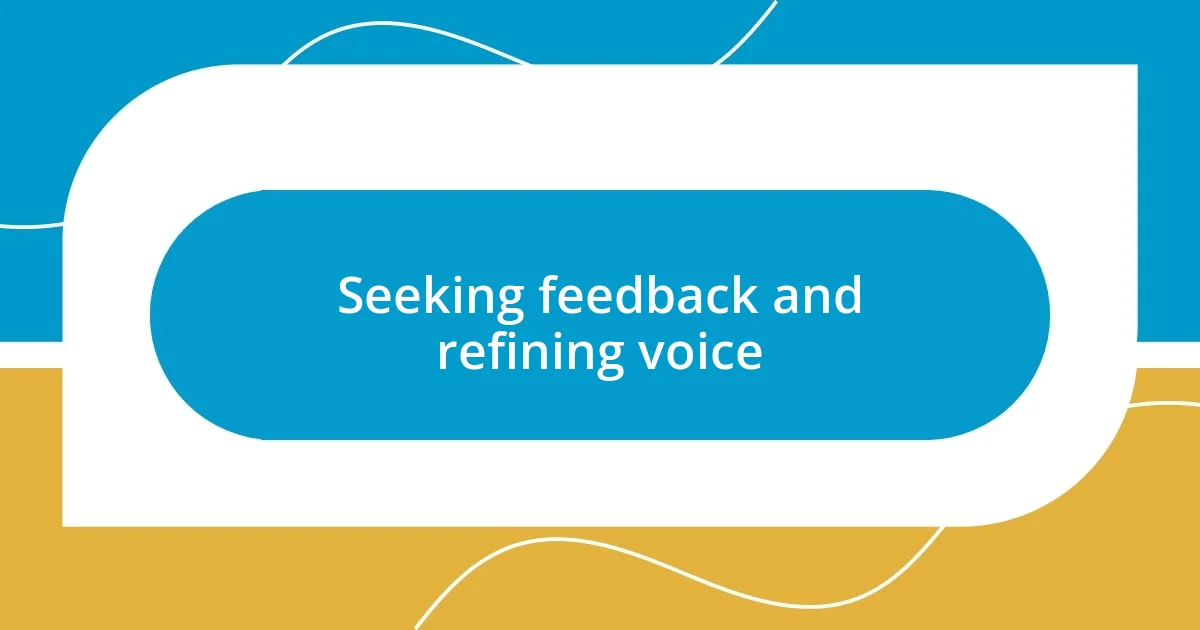
Seeking feedback and refining voice
Seeking feedback can feel daunting, but I’ve found it to be a vital part of refining my voice. I remember the first time I shared my work in a writing group; my heart raced as I awaited their thoughts. Their candid reactions opened my eyes to aspects of my writing I hadn’t considered—strengths I could build on and weaknesses to address. Have you ever received feedback that made you rethink your perspective entirely? For me, it was that moment where I realized that collaboration is a powerful tool for growth.
I also seek feedback from trusted friends who understand my style. I once received a note from a close friend that said, “Your writing makes me feel seen.” Those words resonated deeply, pushing me to explore emotional depth in my work. It reaffirmed my belief that writing is inherently personal, not just a collection of words. Engaging with such insights fuels my desire to refine my voice further—nudging it toward authenticity and resonance.
Moreover, I continuously revisit past pieces to see how my voice has evolved. I recently stumbled upon a short story I wrote a year ago and was surprised at how far I’ve come. Each revision led me to better clarity and expression, like peeling back the layers of an onion. My question for you is this: how often do you reflect on your past work? It can be an enlightening experience that not only showcases your growth but also inspires your future voice.
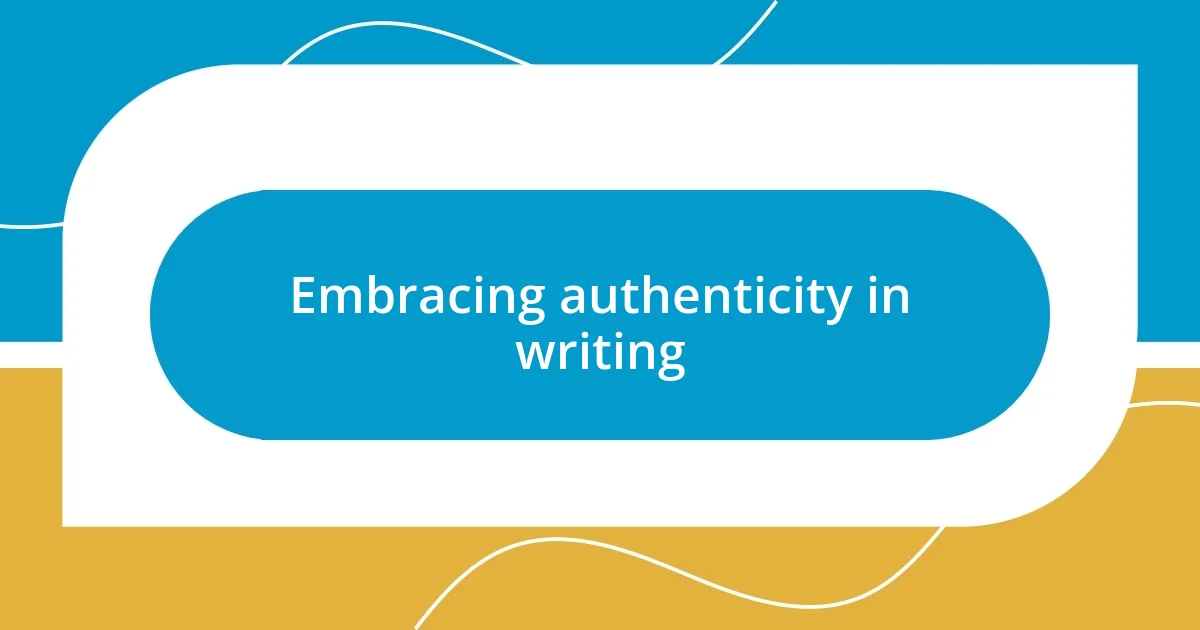
Embracing authenticity in writing
Authenticity in writing is something I hold dear, as it’s this very essence that shapes a writer’s unique voice. I recall a moment when I was crafting a memoir piece, deeply reflecting on my childhood experiences. It was when I wrote about a family gathering that felt simultaneously joyous and suffocating. That tension poured raw truth onto the page, connecting me with readers in ways I hadn’t anticipated. Have you ever felt that rush of clarity while recalling a memory? It bumps up the emotion in our writing and helps to carve out authenticity.
I believe embracing vulnerability can be liberating. When I wrote a piece about my struggle with self-doubt, I hesitated before hitting publish. It was terrifying to let others peek behind the curtain of my insecurities. But, the feedback was overwhelmingly positive, with many resonating with my honesty. This experience taught me that weaving vulnerability into my writing isn’t just personal catharsis; it creates a bridge to others. Have you thought about how your own struggles can resonate with your readers?
Connecting with authenticity also means finding the courage to break away from trends. I once attempted to write in a more popular style, thinking it would heighten my appeal. Yet, it felt disjointed and uncomfortable. The moment I returned to my own conversational tone, filled with quirks and digressions, it felt like finally coming home. It’s invigorating to realize that your unique voice is enough. How often do we chase what’s popular rather than what feels genuine? Embracing authenticity encourages us to trust our instincts and allows our genuine selves to shine through.


